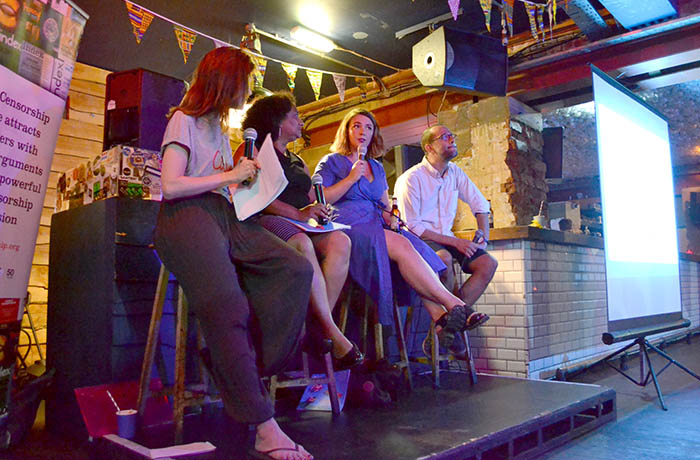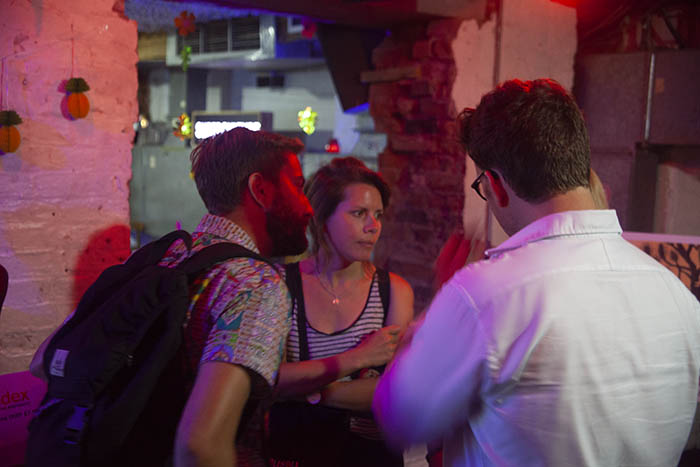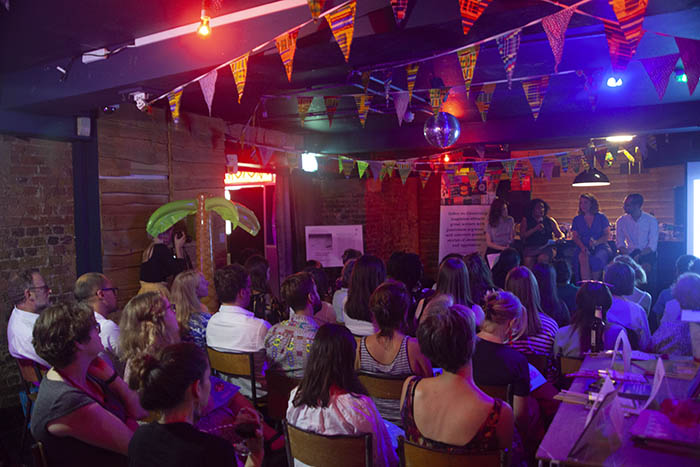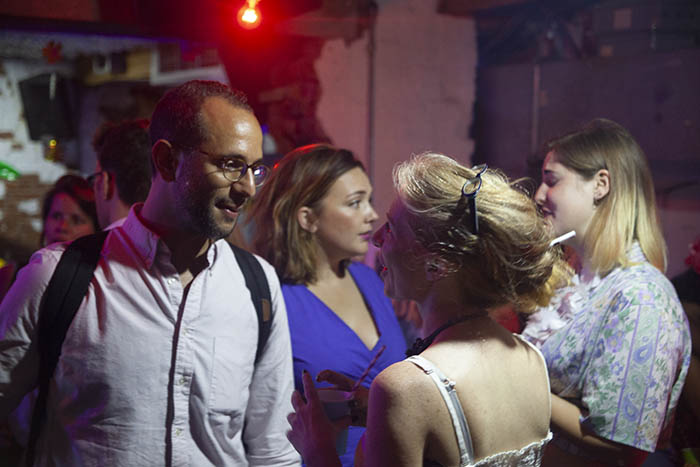5 Jul 2018 | News and features, Volume 47.02 Summer 2018, Volume 47.02 Summer 2018 Extras
[vc_row][vc_column][vc_column_text]

Vicky Baker, Meera Selva, Harriet Fitch Little and Benji Lanyado. Credit: Rosie Gilbey
“I would always err towards saying go rather than don’t go,” said Benji Lanyado, travel writer and founder of picture agency Picfair, speaking at a panel debate to launch the summer 2018 issue of Index on Censorship magazine.
The latest issue of the magazine, Trouble in Paradise, looks at the free speech issues that are prominent in certain top travel destinations, and yet are often overlooked by tourists and the tourist industry. Countries covered included Mexico, Malta, the Philippines and the Maldives. For the launch, a panel of travel writers and editors shared their thoughts on the roles of writers to tell the full story, rather than the nice, PR holiday story, and discussed the free speech implications of travel.
Taking place at The Book Club in Shoreditch, London, Lanyado was joined by former foreign correspondent Meera Selva, and Harriet Fitch Little, a Financial Times writer. The discussion was chaired by Vicky Baker, a journalist at the BBC.

“The best travel writers do weave in the history and the politics of a place,” said Selva, while Fitch Little, talking about travel writing that might be paid for by travel companies or tourist boards as opposed to publications, said “there’s a way to write about a press trip that is fascinating and revealing.”
All panellists agreed on the value of speaking to locals in a destination, though they also acknowledged that doing so was not necessarily on the top of everyone’s holiday priority list, in particular families who might just want a nice break or might not have the budget for more adventurous travel – and that shouldn’t necessarily be condemned. “We all need escapism from time to time,” said Baker.
The panel also discussed whether travel journalists should write about problematic countries at all, raising questions about whether travelling to these places – and encouraging others to travel to them – benefits corrupt regimes.
“The best travel writers don’t just regurgitate the travel documents provided by the government,” Lanyado said.
“Sometimes you can get so obsessed by the pitfalls of a country and the leaders of a country that you forget about the people, and they can be totally different,” he added and asked whether boycotting a country was a form of censorship in its own right.

“If you don’t go, you don’t learn about the people,” said Baker.
Selva recalled a story of a travel journalist who went on a press trip to North Korea. While this journalist had first-hand experience of government propaganda, they also saw another side of the country when their bus driver did a detour into the countryside, heading off the beaten track. Had the travel journalist not gone, they would not have been able to report on this side.
The question of “ethical travel” was picked up by an audience member, Tina Urso from Malta, who spoke about Daphne Caruana Galizia, a Maltese journalist who was murdered on 16 October 2017 some 70 metres away from her home. Her death, which remains unsolved, exposed Malta’s dark side. There is now a memorial to Daphne opposite the central law courts in Valletta, the capital.
Urso said how this memorial is constantly dismantled, but that tourists, more so than locals, regularly rebuild it. She therefore saw the presence of tourists in Malta as playing a fundamental – and positive – role in highlighting these free speech abuses.
Finally, Fitch Little, who worked for local press in Lebanon and Cambodia, noted that there can sometimes be pressure coming from the other direction, namely pressure for writers to ham up the darker sides of destinations and that this too can conceal the real truth. She said how when writing about Cambodia, UK media often wanted a particular angle, usually one related to the Khmer Rouge.
Equally, when working for Time Out in Lebanon, her friends back home found it hard to believe that the country could have nice restaurants, for example, having seen the country in a more negative light. “Less sexy stories don’t get told,” she said.

For more information on the summer issue of the magazine, click here. Included in the issue is an article from a Maltese journalist, Caroline Muscat, on corruption in the country, a look at journalists living under protection due to their reporting of the drug wars in Baja California Sur and an interview with Federica Angeli, a journalist who lives under 24-hour police protection following her exposé of the mafia in the pretty Italian seaside resort of Ostia.
[/vc_column_text][/vc_column][/vc_row][vc_row][vc_column width=”1/3″][vc_custom_heading text=”Trouble in Paradise”][vc_column_text]The summer 2018 issue of Index on Censorship magazine takes you on holiday, just a different kind of holiday. From Malta to the Maldives, we explore how freedom of expression is under attack in dream destinations around the world.
With: Martin Rowson, Jon Savage, Jonathan Tel [/vc_column_text][/vc_column][vc_column width=”1/3″][vc_single_image image=”100843″ img_size=”medium”][/vc_column][vc_column width=”1/3″][vc_custom_heading text=”Subscribe”][vc_column_text]In print, online. In your mailbox, on your iPad.
Subscription options from £18 or just £1.49 in the App Store for a digital issue.
Every subscriber helps support Index on Censorship’s projects around the world.
 SUBSCRIBE NOW[/vc_column_text][/vc_column][/vc_row]
SUBSCRIBE NOW[/vc_column_text][/vc_column][/vc_row]
5 Jul 2018 | Azerbaijan, Azerbaijan Statements, Campaigns -- Featured, Statements
[vc_row][vc_column][vc_column_text]In a joint statement in June, 42 civil society organisations, including Index on Censorship, called on the Parliamentary Assembly of the Council of Europe to appoint a rapporteur to examine the issue of political prisoners in Azerbaijan.
One of the cases highlighted in the statement was that of investigative journalist Afgan Mukhtarli, whose case Index had raised with the Council of Europe’s Platform for the Protection of Journalism and Safety of Journalists after receiving a report through their Mapping Media Freedom platform. Mukhtarli disappeared from Georgia in highly questionable circumstances in 2017, reappearing in Azerbaijan where he was sentenced to six years in jail on what the OSCE media freedom representative has referred to as spurious charges and an attack on free media.
Joy Hyvarinen, head of advocacy at Index, said: “Index on Censorship welcomes the appointment of a rapporteur to prepare a report on political prisoners in Azerbaijan for the Parliamentary Assembly of the Council of Europe. We urge the rapporteur Thorhildur Sunna Ævarsdóttir to prepare a frank report on the situation, in particular the case of journalist Afgan Mukhtarli, who was jailed for six years on spurious charges”.[/vc_column_text][/vc_column][/vc_row][vc_row][vc_column][vc_basic_grid post_type=”post” max_items=”4″ element_width=”6″ grid_id=”vc_gid:1530793587839-a74e8496-f02b-4″ taxonomies=”7145″][/vc_column][/vc_row]
5 Jul 2018 | Events
[vc_row][vc_column][vc_single_image image=”100897″ img_size=”full” alignment=”center”][vc_column_text]50 years on do we need a new Theatres Act? Are artists and cultural institutions entering a new era of self-censorship and if so what does the future look like? Join leading cultural and political figures in a panel discussion that explores the complexities of modern day censorship and its impact on arts and culture.
This event is in collaboration with the Index on Censorship.
There will also be the opportunity to put your questions to the panel on the night #JoinTheDebate
Julia Farrington
Index on Censorship – International freelance producer, campaigner and trainer, working at the intersection between arts and human rights. Specialises in artistic freedom of expression
Shereener Browne – Barrister at Garden Court Chambers with over 23 years experience. She started her legal career at the criminal bar and built a reputation for defending young offenders accused of serious gang-related crimes. In 2016 Shereener embarked up an acting career.
Agnieszka Kolek – Artist, Curator, Polish Woman of the Year 2013 in the UK for Co-organizing and Curating Passion for Freedom London Art Festival.
Anders Lustgarten – Political playwright “renowned for his hard-hitting, wide-ranging approach to political and social questions” (Time Out). Recent work includes The Secret Theatre at Shakespeare’s Globe (2017), an allegory for modern surveillance set in the reign of Elizabeth I.
Kenan Malik – Writer, lecturer and broadcaster. Columnist for the Observer and International New York Times. Latest book: The Quest for a Moral Compass (Atlantic).[/vc_column_text][vc_column_text]
When: Thursday 20 September, 7-8:30pm
Where: Sam Wanamaker Playhouse, 21 New Globe Walk, Bankside, London SE1 9DT (Directions)
Tickets: £15 (£12 Members / Students) via Shakespeare’s Globe
[/vc_column_text][/vc_column][/vc_row]
4 Jul 2018 | Index in the Press
On 20 June, the Legal Affairs Committee of the European Parliament voted in favour of an extremely controversial copyright directive proposed by the European Commission. While promoted as protecting the work done by the creative industry, several provisions within it threaten to significantly limit how we share information on the internet globally in the future, with potentially severe results for freedom of expression online. Read in full.




![]() SUBSCRIBE NOW[/vc_column_text][/vc_column][/vc_row]
SUBSCRIBE NOW[/vc_column_text][/vc_column][/vc_row]